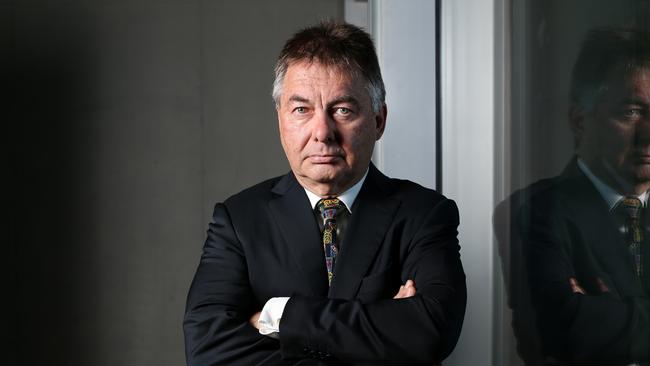Walter Sofronoff slams ACT integrity watchdog as ‘illogical’
In a scathing rebuttal, Walter Sofronoff has blasted the ACT Integrity Commission for making corruption findings against him that were ‘seriously illogical, irrational and/or unreasonable’.

Walter Sofronoff KC has blasted the ACT Integrity Commission for making corruption findings against him that were not based on evidence and were “seriously illogical, irrational and/or unreasonable”.
In a scathing rebuttal of the commission’s finding that he engaged in “serious corrupt conduct” during an inquiry into the prosecution of Bruce Lehrmann, Mr Sofronoff argued he was empowered to do whatever was necessary “for the fair and prompt conduct of the inquiry”.
The integrity watchdog last month published a report saying Mr Sofronoff’s disclosure of confidential documents to journalists during the inquiry damaged its integrity and could possibly constitute a criminal offence.
But Mr Sofronoff, within hours of the findings being published, filed a Federal Court application “challenging the lawfulness of the Integrity Commission’s report”.
In his application for judicial review, released by the Federal Court on Thursday, Mr Sofronoff argued the report was riddled with jurisdictional error and that it was his “unchallenged evidence … that he subjectively considered that it was necessary or convenient for the fair and prompt conduct of the inquiry for him to engage with journalists”.
The release of Mr Sofronoff’s application follows a bid by the Integrity Commission on Tuesday to claim its report cannot be challenged because it may be protected by parliamentary privilege. “It raises the question of whether these proceedings should take place at all,” Scott Robertson SC, for the commission, told the court.
Mr Sofronoff, a former president of the Queensland Court of Appeal, says in his application that he had no obligation of procedural fairness towards the Chief Minister of the ACT, Andrew Barr, and would not have been in breach of it anyway. Mr Sofronoff argued he had been appointed as the Board of Inquiry and therefore could not “commit a contempt of himself” or breach his own non-publication order. There was no evidence to support the finding of the Integrity Commission that his conduct could not “be reasonably regarded as honest”, he argued.
The finding was “seriously illogical, irrational and/or unreasonable”, a form of words Mr Sofronoff used at least a dozen times in his stinging rejection of the Integrity Commissions’ findings, including that his conduct “lacked fidelity and good faith”.
There was also no evidence for the commission’s finding that Mr Sofronoff’s conduct was “deceitful” and “dishonest” in not disclosing to the Chief Minister his intention to give an embargoed copy of the report to journalists, and it too was “seriously illogical, irrational and/or unreasonable”.
The commission’s 130-page report found the former judge had been “significantly compromised” when chairing an inquiry probing the conduct of former ACT chief prosecutor Shane Drumgold during Mr Lehrmann’s rape trial.
It said Mr Sofronoff acted outside of his duties when providing the final report from the inquiry to journalists – The Australian’s Janet Albrechtsen and the ABC’s Elizabeth Byrne – before it had been handed to the Chief Minister. No adverse findings have been made against either journalist.
The commission rejected Mr Sofronoff’s submission that he supplied the final report under embargo because it was “important for these journalists to be prepared for the release of the report”.
The ACT Integrity Commission probe was launched after Acting ACT Supreme Court judge Stephen Kaye last year found Mr Sofronoff’s behaviour during the inquiry gave rise to a “reasonable apprehension of bias”. However, he upheld the majority of Mr Sofronoff’s findings against Mr Drumgold.
Evidence tendered in the ACT Supreme Court hearing revealed Mr Sofronoff had 65 telephone calls with journalists around the time he was chairing the inquiry – 55 with The Australian and 10 with other news outlets.
Mr Sofronoff’s regular communications with Albrechtsen throughout the inquiry meant he “lost sight of the important public function he was discharging”, the commission found.
The Integrity Commission found the disclosure of the report to the journalists and sharing witness statements, report drafts and notices of adverse findings to Albrechtsen could constitute a criminal offence under the Inquiries Act.



